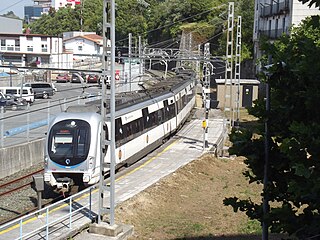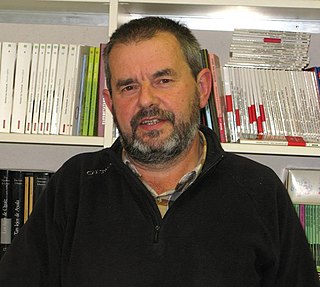
Euskotren Trena, formerly known just as Euskotren is a commuter, inter-city and urban transit train-operating company that operates local and inter-city passenger services in the provinces of Biscay and Gipuzkoa, in the Basque Country, Spain. It is one of the four commercial brands under which Euskotren operates, as a public company managed by the Basque government. The entire 181.1-kilometre (112.5 mi) network uses 1,000 mm narrow gauge rail tracks which have been owned by the Basque Government since their transferral from the Spanish government; the rail tracks and stations were part of the FEVE network until its transferral. Euskotren Trena also operates the Donostia/San Sebastián metro under the brand Metro Donostialdea.

Basque music refers to the music made in the Basque Country, reflecting traits related to its society/tradition, and devised by people from that territory. While traditionally more closely associated to rural based and Basque language music, the growing diversification of its production during the last decades has tipped the scale in favour of a broad definition.

Gipuzkoa is a province of Spain and a historical territory of the autonomous community of the Basque Country. Its capital city is Donostia-San Sebastián. Gipuzkoa shares borders with the French department of Pyrénées-Atlantiques at the northeast, with the province and autonomous community of Navarre at east, Biscay at west, Álava at southwest and the Bay of Biscay to its north. It is located at the easternmost extreme of the Cantabric Sea, in the Bay of Biscay. It has 66 kilometres of coast land.

Alkiza is a rural municipality in the centre of Gipuzkoa, northwest of the Tolosaldea County, in the Basque Country. It is 27 kilometres south of San Sebastian. In 2019 it had 373 inhabitants, of which 88.8% were Basque speakers. Alkiza is an independent municipality since 1731; previously it depended on Tolosa and San Sebastian.

The Donostia-Donostia Klasikoa — Clásica San Sebastián-San Sebastián is a one-day professional men's bicycle road race in northern Spain that has been held every summer since 1981 in San Sebastián. It is the most important one-day race in Spain, is considered a one-day race of great prestige, just behind the 'Monuments', and contributes points towards the UCI World Ranking.

Hernani is a town and municipality located in the province of Gipuzkoa, Basque Autonomous Community, Spain. The town sits on the left bank of the Urumea river. It is located at a distance of 9.2 km from San Sebastián. The municipality of Hernani occupies an area of approximately 40 square kilometres and is bordered by San Sebastián, Astigarraga, Arano, Elduayen, Errenteria, Lasarte-Oria and Urnieta.

Bertsolaritza or bertsolarism is the art of singing improvised songs in Basque according to various melodies and rhyming patterns. Bertsos can be composed at a variety of occasions but are performed generally by one or various bertsolaris onstage in an event arranged for the purpose or as a sideshow, in homage ceremonies, in benefit lunches and suppers, with friends or at a competition. Such a sung piece of composition is called a bertso, the person who sings it is called a bertsolari and the art of composing bertsos is called bertsolaritza in Basque. Traditionally these were sung by men but there is an increasing number of young female bertsolaris today.

Zumarraga is a municipality and industrial town in Gipuzkoa province of the Basque Country autonomous community of northern Spain, approximately 35 miles (56 km) by road southwest of San Sebastián and 10 miles (16 km) northwest of Idiazabal. As of 2018 the municipality had a population of 9834 people. The Urola river flows through the vicinity. It is the birthplace of Miguel López de Legazpi, conquistador who explored the Pacific Islands and the East Indies, and of Iñaki Urdangarín, the husband of Infanta Cristina of Spain.
Etxeberria (Basque pronunciation:[etʃeβeri.a], modern Basque spelling) is a Basque language placename and surname from the Basque Country in Spain and France, meaning 'the new house'. It shows one meaningful variant, Etxeberri (no Basque article –a, 'the'), and a number of later spelling variants produced in Spanish and other languages. Etxebarri(a) is a western Basque dialectal variant, with the same etymology. Etxarri (Echarri) is attested as stemming from Etxaberri.

San Sebastián, officially known by the bilingual name Donostia / San Sebastián, is a city and municipality located in the Basque Autonomous Community, Spain. It lies on the coast of the Bay of Biscay, 20 km from the France–Spain border. The capital city of the province of Gipuzkoa, the municipality's population is 188,102 as of 2021, with its metropolitan area reaching 436,500 in 2010. Locals call themselves donostiarra (singular), both in Spanish and Basque. It is also a part of Basque Eurocity Bayonne-San Sebastián.

A sagardotegi is a type of cider house found in the Basque Country where Basque cider and traditional foods such as cod omelettes are served. Modern sagardotegis can broadly be described as a cross between a steakhouse and a cider house.
Tourism in the Basque Autonomous Community has increased considerably in recent years, and is a popular destination for tourists from Spain and France. According to data from the Eustat the number of tourists entering the region in the year 2009 was 1,991,790, with the final result still pending. 71% of the yearly visitors come from the rest of Spain; the greatest number from Madrid Autonomous Community (14.2%), and Catalonia (11.1%). International visitors make up the remaining 29% - the largest percent come from France (7.2%). 62% of the people who come to the Basque Autonomous Community visit one of the three capitals, 27% visit inland and 11% visit the coast. The average stay of the visitors is 2 days.

Ibilaldia, meaning trip, journey, or march in English, is a festival organized every year the last Sunday of May or first of June to help the ikastolak in Biscay, Basque Country in Spain.

The autonomous community of the Basque Country within Spain contains several comarcas or eskualdeak in the Basque language, referring to local districts, grouped into its three long-established provinces.

The Basque Country is a cross-border cultural region that has a distinctive culture including its own language, customs, festivals, and music.

Antonio Arrúe Zarauz (1903–1976) was a Spanish politician and a Basque cultural activist. Politically he was a Carlist militant throughout all of his life; in the 1950s and 1960s Arrue informally led the Gipuzkoan branch of the party, and from 1957 to 1959 he held the official Traditionalist jefatura in the province. Form 1967 to 1971 he served in the Cortes elected from the so-called tercio familiar. He contributed to Basque culture mostly as organizer and administrator, during the Francoist era engaged especially in Euskaltzaindia. His input as linguist or ethnographer is moderate, though he excelled as one of the best Basque-language orators of his time.

Joxantonio Ormazabal (1948–2010) was a Basque and Spanish author of primarily children's literature in the Basque language. He also published under the pen name of Joxean.

Julián Elorza Aizpuru (1879-1964) was a Spanish Carlist politician. He is best known as advocate of Basque autonomous establishments, promoted during the Restoration, the Primo de Rivera dictatorship and the Second Republic. He was member of the provincial Gipuzkoan self-government and served as its president (1919-1924). Elorza was also the founder and the first president of Sociedad de Estudios Vascos (1919-1936). Politically he refrained from Carlist militancy and remained on conciliatory terms with most other political groupings.
Esteban Muruetagoiena Scola was a doctor who worked in the Basque Country. On March 15, 1982, he was arrested by the Spanish Guardia Civil and then released on the 25th of the same month. He died three days later. His official cause of death was heart failure, but there are notable indications that he had been subject to torture.















